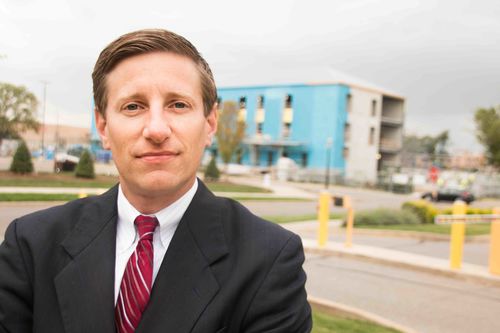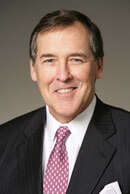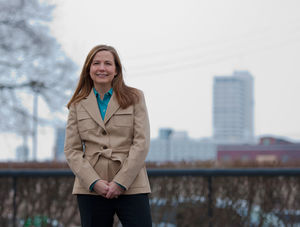ND Law School builds curriculum for students interested in real estate
 “With real estate, the stakes are not only financial. Every type of real estate – from our homes and offices to our neighborhoods and public spaces – affects our ability to flourish as human beings,” Professor Dan Kelly says. Photo by Alicia Sachau, Notre Dame Law School.
“With real estate, the stakes are not only financial. Every type of real estate – from our homes and offices to our neighborhoods and public spaces – affects our ability to flourish as human beings,” Professor Dan Kelly says. Photo by Alicia Sachau, Notre Dame Law School.
Notre Dame Law School rolled out a new program of study this fall for students interested in learning the legal side of the real estate industry.
The new Program of Study in Real Estate Law prepares students to address various real estate issues in legal practice. The program combines a strong group of core faculty, clinical faculty, and adjunct and affiliated faculty to offer foundational courses such as property law, advanced courses on real estate transactions, commercial real estate finance, and land use planning, and numerous related courses such as contract drafting and environmental law. The program also provides opportunities for directed readings, externships and experiential learning, and conferences and events.
“Historically, almost all wealth was in the form of land and real property. Today, real estate continues to be the largest asset class in the world,” said Professor Dan Kelly, who teaches and writes in the areas of property law, trust law, and law and economics. Kelly also serves as the acting director of the Notre Dame Institute for Real Estate, a new University-wide initiative.
“Real estate affects people’s lives,” Kelly added. “It affects where we live, where we work, our places of worship, and where our kids go to school. With real estate, the stakes are not only financial. Every type of real estate – from our homes and offices to our neighborhoods and public spaces – affects our ability to flourish as human beings.”
Lawyers play important roles in all aspects of real estate development, finance, investment, and transactions. Lawyers also play critical roles in drafting, interpreting, and reforming the legal rules and institutions that regulate real estate markets and various uses of property – from federal statutes like the Fair Housing Act to local zoning ordinances. In that context, lawyers can use their skills to promote the common good in ways that are conducive to the long-term growth and sustainability of our communities.
Real estate in the classroom
One of Notre Dame Law School’s distinguished alums – Thomas Patrick Dore Jr., ’76, ’79 J.D. – returned to the Law School this fall and is teaching Real Estate Transactions.
 Pat Dore
Pat Dore
Dore, senior counsel at Davis Polk in New York, has significant experience in cross-border commercial real estate acquisition and development in Spain and South America, and works on joint ventures for the development of golf courses, hotels, and multi-use arena projects. He has been involved extensively over the past decade in creating real estate opportunity funds as well as the public listing of several real estate investment trusts.
“Real estate is complex. You need to know a number of different things – tax law, real property law, banking law – which makes it attractive to learn, because the variety keeps you interested,” Dore said.
The “real” nature of the field is another part of what makes it satisfying, he added.
“No matter how many prospectuses you have, they won’t keep you dry when it rains,” Dore said. “In real estate, you can always see what you’re working on, and when you’re finished, there’s something tangible that’s been constructed.”
Ben Zeter, a 2L from Albuquerque, N.M., is one of the students excited about the new Program of Study in Real Estate Law. He’s taking Dore’s Real Estate Transactions course this fall.
“Out West, land use and development – and all of the associated issues – are very important to people,” said Zeter, who wants to work in real estate in Phoenix after graduation. “Also, my grandparents were architects, so I grew up being fascinated by architecture and buildings.”
Harkesh Patel, a 2L from the Washington, D.C., area, is also taking Real Estate Transactions this fall. He said being raised in a fast-growing real estate market made him interested in the field.
“I always found myself asking questions about how transactions happen,” Patel said. “Over the next two years, I’ll be taking as many courses in the program as I can.”
Developing career paths for students to enter real estate, including placement in top law firms and with leading developers and other real estate professionals, is another goal of the program, Kelly said.
“A lot of Notre Dame alumni work in real estate, but real estate is pretty decentralized as an industry,” Kelly said. “You have to nurture these networks to get people placed.”
Program is a culmination
Although the Program of Study in Real Estate Law is new, it is not being built from scratch. Rather, it is a culmination of faculty expertise and activities that the Law School has developed over the years.
Notre Dame’s Clinical Law Center has assisted low-income South Bend residents with real estate matters such as mortgage foreclosures and predatory lending. James J. Kelly Jr., a clinical professor of law, co-chaired South Bend Mayor Pete Buttigieg’s Vacant & Abandoned Properties Task Force, which launched in 2013 and successfully met its goal of addressing 1,000 abandoned houses in 1,000 days through a combination of rehabilitation and demolition.
The Law School’s faculty has produced a great deal of legal scholarship on real estate issues.
 Professor Nicole Stelle Garnett
Professor Nicole Stelle Garnett
Some notable works include “Ordering the City: Land Use, Policing and the Restoration of Urban America,” written by Nicole Stelle Garnett, the John P. Murphy Foundation Professor of Law, and published in 2009 by Yale University Press, as well as “Law’s Environment: How the Law Shapes the Places We Live,” written by John Copeland Nagle, the John N. Matthews Professor of Law, and published in 2010 by Yale University Press. Another landmark book, “Lost Classroom, Lost Community: Catholic Schools’ Importance in Urban America,” published in 2014 by Chicago University Press, was a collaboration between Garnett and Margaret F. Brinig, the Fritz Duda Family Chair in Law.
The Law School has hosted several events related to real estate, too. For example, in 2013, Bank of America sponsored a conference called “Reimagining Homeownership.” The conference brought together leading scholars in law, economics, finance, sociology, and psychology, along with regulators and homebuilders as well as representatives from banking and affordable housing. They discussed the state of homeownership in the United States and the reforms needed in the residential real estate industry, especially in the wake of the financial and mortgage crisis.
“Real estate was important in the past. It is crucial today, and it will be critical going forward,” Kelly said. “That’s what makes this new program so exciting.”